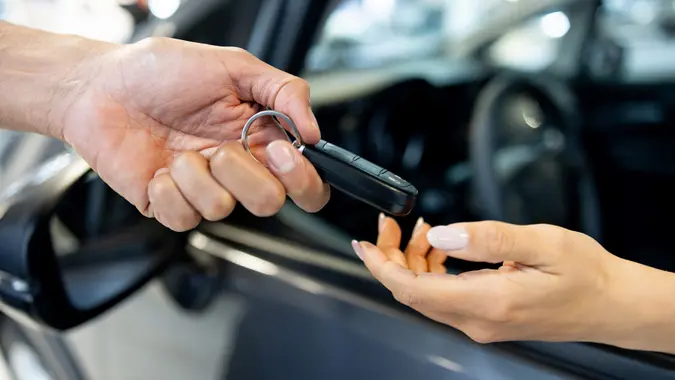Rent-to-Own Cars: How It Works and What To Know Before You Buy

Commitment to Our Readers
GOBankingRates' editorial team is committed to bringing you unbiased reviews and information. We use data-driven methodologies to evaluate financial products and services - our reviews and ratings are not influenced by advertisers. You can read more about our editorial guidelines and our products and services review methodology.

20 Years
Helping You Live Richer

Reviewed
by Experts

Trusted by
Millions of Readers
If you’re in the market for a vehicle, you may believe you have two options: leasing or buying the vehicle outright, often through an auto loan. But buyers with bad credit or no credit history may consider another alternative: rent-to-own car programs.
Rent-to-own car agreements allow you to rent the vehicle for the long term, often one to three years. Rent payments go toward the eventual purchase of the car.
Buying a car on a rent-to-own basis can be a good temporary solution if you need a vehicle quickly and don’t qualify for a traditional lease or loan.
How Do Rent-to-Own Cars Work?
Rent-to-own car agreements are typically offered by “buy here, pay here” used auto dealerships. There is no financing company, so the dealer can be more flexible.
When you sign a rent-to-own agreement, you make payments to the dealer who owns the car. You can return the car at any time, but you’ll lose the money you paid for it.
If you decide to keep the car, continue making on-time payments. Once you’ve paid for the vehicle in full, the dealer transfers the title to your name.
The Rent-to-Own Process
The rent-to-own process has some advantages for buyers low on cash or with poor credit or no credit history.
- Most dealers don’t do a credit check.
- You may be required to prove you can make the payments by showing proof of employment.
- Buyers make weekly or biweekly payments, and those payments go toward owning the vehicle.
- There may be a lump-sum buyout option at the end of the rental agreement, or payments might remain stable throughout the course of the rental.
Rent-to-Own vs. Traditional Car Financing
Understanding the key differences between rent-to-own and traditional car financing can help you decide which option is best for you.
| Rent-to-Own | Traditional Car Financing | |
|---|---|---|
| Best for | Buyers with poor credit or no credit who need a car quickly and have steady pay | Buyers with good credit who can make monthly payments, may want to keep their cash in the bank |
| Credit check | No credit check | Requires good credit |
| Ownership | After final payment | Immediate ownership |
| Payment frequency | Weekly or bi-weekly | Monthly |
| Interest rates | Typically higher | Can be as low as 0% for borrowers with excellent credit |
| Vehicle selection | Limited to dealer inventory | Wide selection |
| Vehicle age | Used, late-model cars | Choices of new, used or certified pre-owned |
| Warranty | Not usually available | Usually available |
Pros and Cons of Rent-to-Own Auto Programs
As with most financial decisions, rent-to-own auto programs have benefits and drawbacks.
Advantages
- No credit check required
- Flexible approval process
- Short-term option for those who need a vehicle fast
- Payments may contribute to eventual ownership
Disadvantages
- Higher overall cost compared to financing
- Limited selection of vehicles
- Stricter payment terms — missed payments can lead to repossession
- No guarantee of ownership until final payment
- Will not help build your credit
How To Find a Reliable Rent-to-Own Car Dealer
Not every used car dealer has your best interests in mind, so it’s important to research carefully before entering a rent-to-own agreement. To find a reliable dealer, follow these steps.
Step 1. Research Local Dealerships and Online Sites
Many local used car dealers offer rent-to-own programs for buyers with poor credit. Some dealers, like EZCreditCar.com, even offer warranties.
When comparing dealers, you’ll want to compare factors such as:
- Minimum payment price
- Income required
- Warranty or no warranty
- Vehicle selection
- Added fees or charges
- Late charges
Also look at what percentage of your payment goes toward the vehicle’s purchase price. For instance, EZCreditCar.com’s program puts your entire payment toward the purchase.
DriveItAway, on the other hand, offers new or used cars with no credit check, but only 85% of your payments go toward the buyout.
Step 2. Read Reviews and Check the Dealer’s Reputation
Once you’ve narrowed your choices down to a few dealers, refer to Yelp, Google Reviews or the Better Business Bureau website to read reviews and look for complaints.
Ask questions in local Facebook groups about a dealer’s reputation and service.
Step 3. Understand the Contract Terms
With rent-to-own arrangements, missing one payment could mean vehicle repossession. Make sure you understand the following:
- Payment schedule.
- How you can make payments — direct debit, in-person, online or by phone.
- The final buyout price and date.
Step 3. Compare Costs With Traditional Financing Options
You might be surprised that you can qualify for an auto loan, even with poor credit. Compare the costs of rent-to-own, where the initial vehicle price may be marked up, vs. buying a car with traditional financing.
Purchasing a car using traditional financing gives you more leeway to negotiate the purchase price.
Step 4. Inspect the Vehicle Before Signing Any Agreement
Many rent-to-own cars do not come with a warranty. If you can, have a mechanic you trust inspect the vehicle before purchase.
Look over every inch of the car’s interior and exterior, and take videos and photos before you leave the lot.
Who Should Consider Rent-to-Own Cars?
If you have bad credit or no credit history, rent-to-own cars can help get you on the road faster than waiting for months (or years) to rebuild your credit.
Temporary residents who cannot get a good rate on a lease and don’t want a long-term loan commitment might also prefer renting to own for two to three years.
Who Should Skip Rent-to-Own Cars?
A rent-to-own agreement is probably not the right choice for most people who qualify for traditional financing. Renting to own is pricier, in the long term, and if you miss a single payment, the car might be repossessed.
Rent-to-own vehicles are typically limited to whatever used cars the dealer has available on the lot. If you want to choose between a wide selection of new, used or certified pre-owned vehicles, you’ll need traditional financing.
Alternatives To Rent-to-Own Cars
Rent-to-own is just one solution to getting a car quickly. There are other alternatives to consider.
Buy Here, Pay Here Dealerships
Many small, local used car dealerships offer “buy here, pay here” deals for customers with no credit or poor credit.
Similar to rent-to-own programs, buy here, pay here programs are financed directly through the dealership, not a third party that runs a credit check.
The drawbacks? On-time payments may not help build your credit and interest rates could be much higher than a traditional auto loan.
Co-Signed Auto Loans
If you have someone, such as a parent or spouse, willing to co-sign your auto loan, you may be able to secure a lower interest rate through a traditional lender or dealership.
As long as you can afford the monthly payments, you may be able to get the car you want, complete with a warranty.
Credit-Building Auto Loans
Some lenders specialize in auto loans for consumers with low credit scores. These sub-prime loans have higher interest rates, but they will help you build your credit, unlike a rent-to-own program.
FAQ
Here are the answers to some of the most frequently asked questions about rent-to-own cars.- How does rent-to-own work for cars?
- Local used car dealerships sometimes offer rent-to-own arrangements for people with poor credit or no credit history.
- Buyers make weekly or bi-weekly payments that go toward the purchase price of the car.
- The title remains in the dealer's name until the final payment is made. At that point, the buyer owns the car.
- Do rent-to-own auto programs affect my credit score?
- Rent-to-own auto programs do not require a credit check. Most dealers providing rent-to-own options do not report late or on-time payments to the credit bureaus, so this type of arrangement won't affect your credit score in any way.
- What happens if I miss a payment on a rent-to-own car?
- If you miss a payment on a rent-to-own car, you might have to pay a late fee. The vehicle might also be repossessed.
- Is rent-to-own better than leasing a car?
- Rent-to-own car programs are designed for people with no credit or poor credit.
- Dealers offering rent-to-own arrangements typically charge more for these cars and require weekly or bi-weekly payments. Typically, people rent-to-own used cars with no warranty from local dealers.
- A car lease, on the other hand, usually has lower monthly payments for a new vehicle with a warranty. The best choice depends on your financial situation and immediate needs.
- Can I return a rent-to-own car if I no longer want it?
- You can return a rent-to-own car before the buyout date, but you will forfeit all the cash you already paid for the vehicle.
Our in-house research team and on-site financial experts work together to create content that’s accurate, impartial, and up to date. We fact-check every single statistic, quote and fact using trusted primary resources to make sure the information we provide is correct. You can learn more about GOBankingRates’ processes and standards in our editorial policy.
- Experian. 2024. "What Is Buy Here, Pay Here Auto Financing?"
 Written by
Written by  Edited by
Edited by 

























